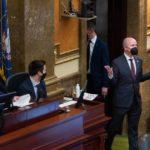DENVER (AP) — After hours of objections by Republicans, Colorado’s Democrat-led House on Wednesday approved a bill designed to lift child vaccination rates that are among the lowest in the nation.
The 40-24 vote sends the bill, long sought by Democrats, to the Senate, which on Thursday will vote on an amended version that allows those who oppose vaccinations to try to put a repeal measure on the 2022 ballot. If that occurs and a repeal fails, the law would go into effect in 2023.
Democratic Gov. Jared Polis is expected to sign the bill, which adds new requirements for parents who choose to opt out of routine vaccinations on religious or personal grounds. Parents would have to submit a form signed by a medical provider or provide proof they watched a state-produced video on vaccinations in order to exempt their children.
Current law requires that students’ parents simply submit a statement to a school professing religious or personal objections to having their children vaccinated.
In 2017, just over 87% of Colorado kindergarten students had vaccinations for measles, mumps and rubella, according to the Centers for Disease Control and Prevention National Immunization Survey. The U.S. vaccination average was 91.5%, with only Indiana and Missouri having lower rates than Colorado.
Data from the CDC’s National Center for Immunization and Respiratory Diseases suggest that Colorado’s kindergarten vaccination rate was the worst among the 50 U.S. states in the 2018-2019 school year.
The bill seeks to boost Colorado’s school vaccine rates to 95%.
In recent years, Democrats’ efforts to adopt new exemption requirements generated intensely vocal opposition from parents and anti-vaccination advocacy groups. Republicans successfully stonewalled an effort to enact a bill last year.
On Wednesday, lawmakers voiced personal stories about vaccination — many as parents who had to decide whether to vaccinate their children.
Republican Rep. Perry Will spoke about his 3-month-old son who got his vaccinations and ended up at the hospital.
“We never did get a prognosis of what it was. They finally called it a viral pneumonia because they didn’t know what else to call it,” Will said. “I know in my heart of hearts it was from the vaccines.”
Democratic Rep. Bri Buentello, a special education teacher, reacted emotionally to Republicans voicing unfounded theories that vaccines cause autism. Her son, Noel, is autistic.
“Vaccines do not cause autism. Full stop,” she paid, pounding her fist on the podium. To those choosing not to vaccinate over autism fears, she declared: “You would rather have a dead child than a child with autism. Don’t talk about my child that way.”
Republicans insisted they weren’t given time to either help craft or have constituents testify on the bill. They also objected to the state having access to data about individuals’ objections to having their children vaccinated. The bill would require medical professionals to submit immunization or medical or non-medical exemption data to a state immunization tracking system.
Nieberg is a corps member for the Associated Press/Report for America Statehouse News Initiative. Report for America is a nonprofit national service program that places journalists in local newsrooms to report on undercovered issues.
Copyright 2020 Associated Press. All rights reserved. This material may not be published, broadcast, rewritten, or redistributed.
This content was originally published here.






We encourage lively debate, but please be respectful of others. Profanity and personal attacks are prohibited. By commenting, you are agreeing to abide by our user agreement.
All comments are public.